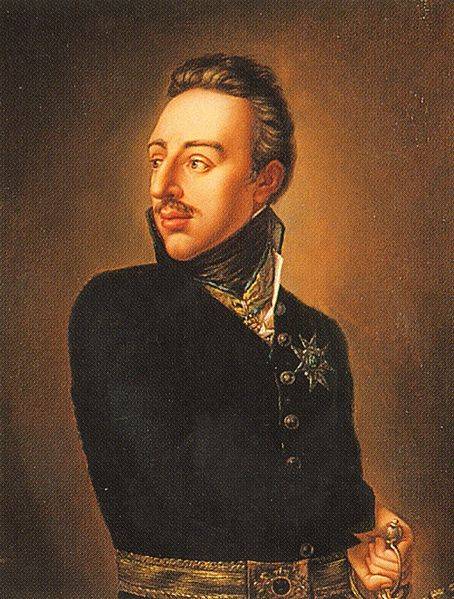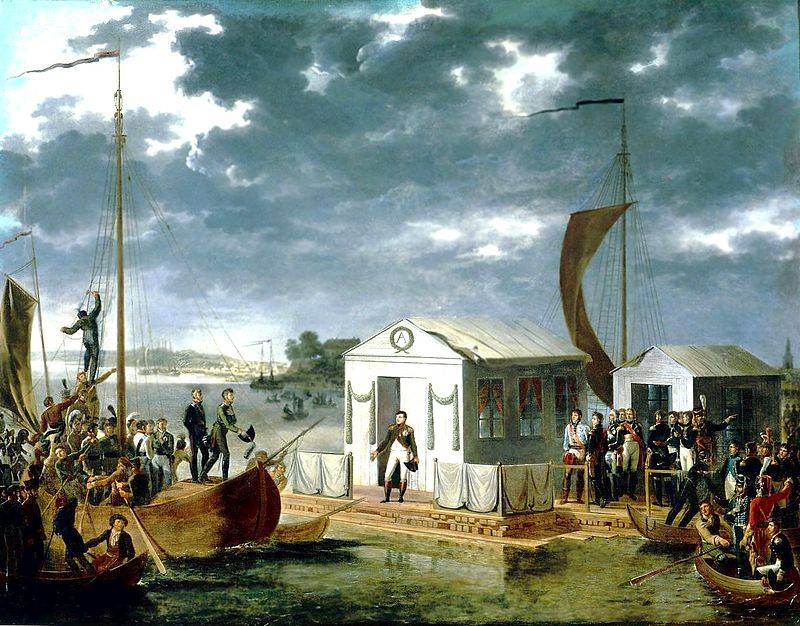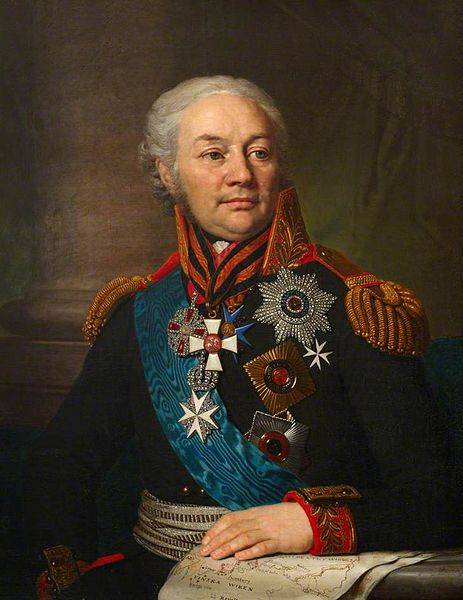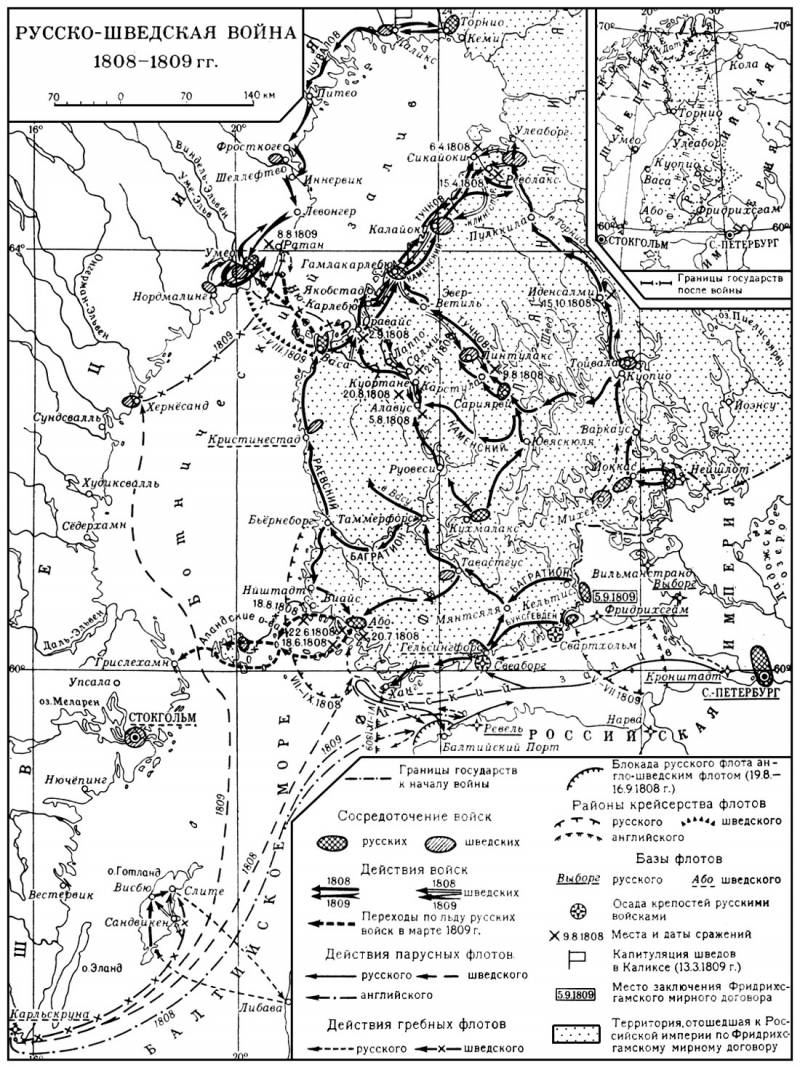How Russia got the opportunity to join Sweden
Russia after Tilsit became an ally of Napoleon’s empire and the enemy of England. The Swedish crown refused to put up with Paris and headed for rapprochement with London. Russia's demand to close the Baltic Sea to the British for the Swedish king Gustav IV rejected and began preparations for the war with Denmark to conquer Norway from her. And Denmark was a traditional ally of Russia. As a result, Alexander, with the full support of Napoleon, decided to occupy Finland, to "reassure" Sweden and strengthen the security of the north-western borders of the St. Petersburg district of the capital.
The Big Game
The Russian-Swedish war was the result of the European opposition of the end of the XVIII - beginning of the XIX centuries. The Great French Revolution led to the fact that France made a qualitative leap in development and became a threat not only to neighboring monarchies, but began to claim leadership in the Western project (civilization). That is, France has challenged England, which claimed hegemony in Europe and the world. This was the main prerequisite for a whole series of wars, when the neighbors of France tried to destroy the revolutionary government by force. However, France withstood the blow, and she herself went on the offensive, claiming leadership in Europe and creating a kind of "European Union" led by the French. At the same time the head of France was one of the most brilliant people in stories Europe, the commander and statesman Napoleon Bonaparte, who has gone from a simple artillery officer to the ruler of the French Empire.
Russia got into this European “bloody mess”, although it had no common borders with France and no contradictions with it (territorial, historical, national, economic, etc.). Empress Catherine II became one of the main ideologists of the intervention in France. The whole world community of that time overran its phrase: “the work of Louis XVI is the work of all the sovereigns of Europe”. After the execution of the king, Catherine publicly cried and even declared that “all French should be eradicated,” after such a crime. In response, the French revolutionaries began their information war against the “Russian ultra-linguists”. It is worth noting that, despite the righteous anger, Catherine was a practical and intelligent woman and did not go beyond words. As long as monarchical Western Europe took up arms against revolutionary France, Russia could calmly solve its national tasks. In particular, a sensible empress settled Polish affairs at this time, returning the South and West Russian lands lost hundreds of years ago to Russia. By reuniting the divided Russian people and ensuring security in the western strategic direction. Obviously, Catherine would have decided in favor of Russia and the Turkish issue, having finished off the Ottomans and taking away Constantinople-Tsargrad and the Black Sea straits. But the empress died, not having managed to complete this great work.
Her son Pavel, in peak of his late mother, with whom he had a conflict, decided to completely revise the policy of St. Petersburg. At first I decided to abandon wars altogether. Russia pulled out of the First Anti-French Coalition. But then he let himself be convinced that without Russian intervention, order could not be restored in Europe. And he moved the squadron of Ushakov to the Mediterranean, and the army of Suvorov to Italy. The Russian wonder-heroes won brilliant victories at sea and land, but on the whole it was not our war. Pavel quickly realized that I was using the Russians as “cannon fodder” in the interests of Vienna and London, and at the same time I was constantly being attacked. In 1800, in the report of Rostopchina opposite the words "England armed with all the threats, cunning and money all the powers against France", the Russian sovereign personally wrote: "And we are sinners." Paul was not a fool, as he is usually portrayed. The enraged Russian tsar immediately stopped the war with France and began negotiations with the "Corsican monster."
A Russian-French strategic alliance was brewing, which delivered a mortal blow to England’s plans for world domination. The policy of rapprochement with France, with which we did not have common borders, from this moment corresponded to the national interests of Russia. While London, Vienna and Berlin were linked by France, Russia received a unique chance to solve its most important problems. It was a gift of fate. Russia could solve issues of internal development without fear of external invasion, the task of expanding the sphere of influence in the Balkans, the Caucasus, Turkestan, and the Far East (including consolidation in Russian America). It was necessary to close the issue with the Black Sea straits, forever securing the Russian Black Sea region and the Caucasus. In the north, it was necessary to knock out the Swedes from Finland in order to reliably protect the capital. It is clear that the British octopus became alarmed and organized the hands of the degenerated Russian aristocrats to murder the sovereign Pavel.
After the assassination of Emperor Pavel Petrovich - with the help of British gold - Russia soon again became the enemy of France. Alexander Pavlovich should either continue the policy of friendship with Napoleon or re-enter the anti-French coalition. In the Russian national interest was an alliance with France. However, Alexander preferred an alliance with Austria and England. Firstly, here, apparently, the psychological factor played a role. Alexander was shocked by the murder of his father, surrounded by his murderers and was afraid of a new palace coup. This fear haunted him to the end of his life. In addition, representatives of the anti-French party played on the ambition of the young Russian tsar, he was told that he was a great politician and commander who should stop the "Corsican monster." Alexander himself was extremely ambitious and dreamed of fame.
Secondly, it was influenced by a strong German party at court. The Romanovs traditionally had strong ties in Germany. So, Alexander's mother was the Wurttemberg princess Sofia Dorothea (in Maria Orthodoxy), and the wife is Princess Louise Badenskaya (Elizaveta Alekseevna). A crowd of their relatives and close friends traditionally lined up at the court. Also in the Russian elite there were many Germans from the Baltic states. They were related and other ties with the Russian aristocracy. It turned out a powerful pro-German party. She insisted on intervening in German affairs. Some had vested interests, others had relatives who suffered from Napoleon’s policies. Naturally, the policy of creating the "European Union" led by France extremely irritated the Germans. Vienna and Berlin did everything that Russia again entered the struggle with France.
Thus, against national interests (the Russians had no fundamental contradictions with the French), Russia fought with France in the interests of London, Vienna and Paris in the III and IV anti-French coalitions 1805 and 1806 - 1807. Although Napoleon himself always sought a strategic alliance with the Russians and had no territorial claims against Russia. All of them led to heavy losses and defeats due to the fault of the Russian "partners". Napoleon took up. Emperor Alexander Pavlovich, against his will, was forced to make peace.
Sweden fought against Napoleon. King Gustav IV, like Alexander, longed for military glory. In addition, Sweden had a material interest - the seizure of land in Pomerania. In the 1805 war of the year, the Swedes were forced to retreat from Pomerania. Sweden also took part in the war of the Fourth Coalition. But I got smarter. Gustav took the English money, but was in no hurry to send soldiers to the slaughterhouse. Tilsit peace ended the Russian-French war. And Sweden remained an ally of England.

Swedish king Gustav IV Adolf
Napoleon, despite the victory in the war, did not demand anything beyond the power of Alexander. As little as possible interfere in the affairs of Germany and Western Europe as a whole and break off relations with England. Russia joined the continental blockade of England — a system of economic and political sanctions organized by Napoleon. Napoleon did not ask for military support, only strictly neutrality. In return, the French emperor offered Alexander free hands with Sweden and the Ottoman Empire. In the Swedish question, Napoleon was quite sincere. In his interest was the conflict of Russia and Sweden with England, who was behind the Swedes.
In the Turkish question, Napoleon was cunning. France had serious interests in the Turkish Empire - both strategic, territorial (Egypt, Syria), and economic. The French also had strategic interests in the western Balkans. No less strongly seemed the Turkish question and Austria. And Napoleon at that time was vacillating between Russia and Austria. However, St. Petersburg could radically change the balance in its favor and get the Bosphorus and the Dardanelles. For this, Alexander had to change his personal attitude to Napoleon and agree with him on fundamental issues. In particular, Porto should be divided into spheres of influence: Russia - the Caucasus, the Constantinople District and the straits zone, France - Egypt, Palestine, Syria, etc. It was also necessary to establish a relative alliance with Napoleon, giving Alexander's sister to him. Taking into account the difficult situation of Napoleon’s empire: the confrontation with England, the situation in Spain, the unrest in Germany, etc., it was extremely beneficial for the French emperor to create the axis Paris-Petersburg. As a result, Alexander’s cold position pushed Napoleon into an alliance with Austria, including the marriage (Marie-Louise of Austria).
Denmark was to become a member of the bloc of England. In response, in August 1807, the United Kingdom launched a pirate attack on Copenhagen and captured the entire Danish navy. The House of Romanov had family ties with the Danish and Holstein courtyards. In addition, Denmark has been a traditional ally of Russia in the wars with Sweden for more than a hundred years. Therefore, in October 1807 of the year, Russia presented England with an ultimatum - the rupture of diplomatic relations until the fleet was returned to Denmark and all losses inflicted on it were repaired. Emperor Alexander I demanded assistance from Sweden in order to keep the Baltic Sea closed to the fleets of the Western powers on the basis of the 1780 and 1800 agreements. Gustav IV rejected these demands and headed for rapprochement with England. As a result, there was a gap between Russia and England - the embassies were mutually withdrawn and the sluggish English-Russian war of 1807 - 1812 began. By a Senate decree of 20 in March, 1808 in Russia imposed a ban on the import of British goods into Russia.
Napoleon suggested that St. Petersburg force Sweden to close ports for British ships. In January, 1808, Napoleon advised Alexander to increase and strengthen his army, "remove the Swedes from his capital" and "spread their borders as far as possible." Napoleon offered his help and assistance in this matter. 5 February 1808, Napoleon told the Russian ambassador in Paris, Count Tolstoy, that he would agree to Russia acquire all of Sweden, including Stockholm.
England, for its part, in February 1808, entered into an agreement with Sweden, under which it pledged to pay Sweden 1 million pounds per month during the war with Russia, no matter how long it lasts. In addition, the British promised to provide Sweden with an auxiliary 14-thousand. corps to protect its western borders, so that the entire Swedish army could go to the eastern front against Russia. After that, the war became inevitable.

The meeting of Napoleon I and Alexander I on the Neman 25 June 1807
The outbreak of war
Formal reason for the start of the war gave the Swedes themselves. 1 (13) February 1808, the Swedish king Gustav IV, informed the Russian ambassador in Stockholm that reconciliation between Sweden and Russia was impossible as long as the Russians held Eastern Finland. That is, the Swedes were still hoping for revenge for the previous defeats.
At the beginning of 1808, the Russian army (about 24 thousand people) was located along the border between Friedrichsgam and Nyslott. The leadership of the army was entrusted to Count F. F. Bucksgevden. The army was small, as Russia was at war with Turkey. In addition, Alexander did not trust Napoleon, and the main part of the Russian army was located at the western borders of the empire in case of a new war with France. This predetermined the delay of the war. That is, Alexander had the opportunity to concentrate a large army and quickly decide the war in his favor, but did not.

Count Fedor Fedorovich Buksgevden
The Swedes in Finland at that time had 19 Thousands of soldiers under the temporary command of General Clerker. Commander Earl Klingspor was still in Stockholm. When Count Klingspor finally went to Finland, the plan was not to engage in battle with the enemy, to hold the fortress of Sveaborg to the last extreme and, if possible, to act in the rear of the Russians. The Swedish king decided to deliver the main blow to the Danish troops in Norway. Therefore, the Swedes failed to gather significant forces for action in Finland.
Russian troops 9 (21) February crossed the border of Finland on the river Kyumen. Formally, the war in Russia was reported only in March. The population was informed that "the Stockholm court refused to unite with Russia and Denmark in order to close the Baltic Sea of England before committing the sea world." The message indicated that having exhausted their methods of persuasion, the Russians crossed the border and lead successful battles. 16 March 1808. Alexander issued a Manifesto (Declaration) on the accession of Finland. The reason for the publication of the manifesto was the arrest of the Russian embassy in Stockholm. The Manifesto said: "The obvious tendency of the King of Sweden to hostile us hostile, the new alliance with her and, finally, violent and incredible act with our envoy in Stockholm ... made the war inevitable." The accession of Finland (its Swedish part) to Russia was served as a punishment in response to Sweden’s failure to fulfill its allied obligations towards Russia under the 1800 agreement of the year and its alliance with the enemy of Russia - England. The Manifesto stated that “from now on, a part of Finland, known by the name of Swedish Finland (southwestern part), occupied by Russian troops who suffered losses in manpower and costs of material order, is recognized as an area conquered by the strength of the Russian weapons, and forever joins the Russian Empire. "
It is worth noting that the war with Sweden was not popular in the Russian court. In Russia, the secular society, where the positions of the Anglo and Germanophiles were strong, saw in the fighting only a service to Napoleon. “For the first time, perhaps, since Russia exists, the offensive war against its old enemies has been loudly condemned by all Russians, and the successes of our troops are revered by dishonor,” wrote F. Vigel about this. That is, the westernized elite of Russia did not see that the war with Sweden solves important national tasks on the security of the north-western borders of the empire, the capital.
February 18 (March 1) Russians occupied Helsingfors. Swedish troops took refuge in Sveaborg. Count Klingspor retreated to Tammerfors, ordering all the troops scattered in northern Finland to go there too. Following that, 24 February (7 March) Tavastehus was occupied by Russian troops. February 27 (March 10) Buxgevden ordered Prince Bagration to pursue Klingspor, and General Tuchkov to try to cut off his retreat. 10 March, our troops occupied Abo. Buksgevden himself decided to begin the siege of Sveaborg, the main fortress of the Swedes in Finland. The Swedes called it the "Gibraltar of the North." 22 April after 12-day bombing Sveaborg capitulated.
Thus, the start of the war was successful for Russia. However, serious mistakes were made. So, our troops occupied, and then left the Åland Islands. After he received an order to occupy the islands again. They were occupied by a small detachment of Vuich, who did not even have guns. As soon as the ice began to melt, the Swedes landed troops and with the support of local residents defeated the Russian squad. The Åland Islands have become a springboard for landing operations and the operational base of the Swedish fleet.

Information